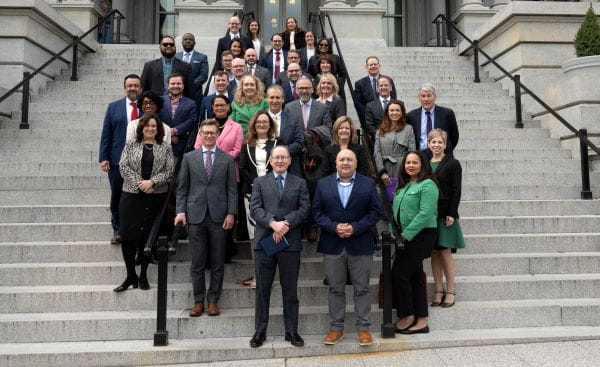The web Browser you are currently using is unsupported, and some features of this site may not work as intended. Please update to a modern browser such as Chrome, Firefox or Edge to experience all features Michigan.gov has to offer.
Michigan State Superintendent, Other State School Chiefs Attend White House Campus Event
March 25, 2024
LANSING – State Superintendent Dr. Michael F. Rice visited the White House campus to support Michigan students, staff, and schools.
Dr. Rice and other state education chiefs were in Washington, D.C., at the Council of Chief State School Officers (CCSSO) 2024 Legislative Conference. On Friday, March 22, he and other state school leaders met on the White House campus with Neera Tanden, President Biden’s Domestic Policy Council director; U.S. Department of Education Deputy Secretary Cindy Marten; and other council and department staff.
“Michigan children and children across the country benefit when their educational leaders exchange ideas with the Biden administration and our partners in the U.S. Senate and House, as well as with one another,” Dr. Rice said. “CCSSO convenings are great opportunities for state school chiefs to learn from one another and to share with one another, in service to children. Extending lessons learned during the pandemic, particularly with federal pandemic relief packages, was top of mind during the conference and meeting.”
State chiefs and CCSSO leadership shared efforts by the states to strengthen public education in the wake of the pandemic, including improvement of early literacy skills, supporting children’s mental health, and addressing teacher, helping professional, and other educator shortages, which are Goals 2, 3, and 7, respectively, of Michigan’s Top 10 Strategic Education Plan. A summary:
- Improvement of early literacy (Goal 2 of the Top 10 Strategic Education Plan): In the fiscal year 2024 budget, Gov. Gretchen Whitmer and the Michigan Legislature negotiated $150 million for MI Kids Back on Track tutoring support and $140 million for literacy supports, as well as additional literacy coaches, to represent almost a tripling of literacy coaches in the last few years. MDE has promoted and partnered on Language Essentials for Teachers of Reading and Spelling (LETRS) science of literacy training for elementary educators and produced extensive literacy guidance and/or professional development opportunities on both the “how” and “why” of literacy: on dyslexia, diversity in literacy, diverse classroom libraries, and accelerated learning, among other related efforts.
- Improvement of the Health, Safety, and Wellness of Students (Goal 3 of the Top 10 Strategic Education Plan): Funding for children’s mental health/school safety in the state school aid act has increased from nothing in fiscal year 2018 to more than $440 million in fiscal year 2024, with the lobbying of local, regional, and state educational leaders and the support of the legislature and governor. With these funding increases, school districts have increased by more than 1,000 the number of helping professionals in districts across the state – school social workers, school psychologists, nurses, and guidance counselors. Local and intermediate school districts are working with one another, their providers, and the department to build out more substantial mental health supports for Michigan students.
- Addressing of teacher shortages (Goal 7 of the Top 10 Strategic Education Plan): Funding to address the teacher shortage increased from nothing in the state school aid act in fiscal year 2020 and earlier fiscal years to $575 million in fiscal year 2023 and $448 million in fiscal year 2024, with a series of specific recommendations from MDE and support from the legislature and governor. New appropriations have included, but are not limited to, teacher preparation fellowships, Grow Your Own programs for support staff and students aspiring to be teachers, student teacher stipends, teacher loan repayment, a rural credentialing hub, and mentoring for teachers, principals, and other educators.
The number of students in Michigan educator preparation programs has increased by 56 percent, from 9,512 in 2016-2017 to 14,829 in 2021-22. The U.S. Department of Education has recognized Michigan twice in the last two years – for being one of three states to increase education staffing from June 2019 to June 2022 and for being one of seven states to do so from June 2019 to June 2023, when Michigan ranked second among those able to lightly increase education staffing in spite of the pandemic and the teacher shortage.

State Superintendent Dr. Michael Rice, front left, and state school chiefs from around the country are shown during the Council of Chief State School Officers 2024 Legislative Conference in Washington, D.C.
Author: